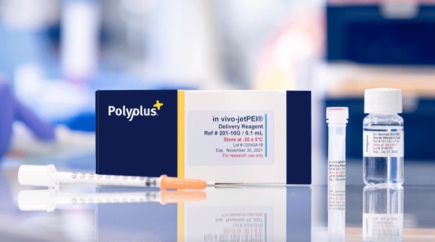in vivo-jetPEI® is a ready-to-use cationic polymer reagent recommended for in vivo transfection of DNA, siRNA, miRNA, shRNA and other oligonucleotide...

Vaccination and immunization correspond to the process of educating and activating the immune system against a specific antigen. Vaccination can be achieved using three different ways: traditionally, vaccination is performed by administration of the whole pathogen either killed or weakened and formulated with adjuvants. Secondly, vaccination can also be achieved by delivery of a recombinant protein or peptide mimicking the natural antigen/epitope. Finally, genetic vaccination is an emerging powerful approach consisting of introducing a plasmid DNA encoding in situ a specific antigen, hence initiating an immune response. These two last options for vaccination present the advantage of greatly limiting the health risks associated with the administration of a live pathogen. In most cases, vaccines were developed to protect the organism against viral pathogens. However, many tumor-associated antigens were identified. Consequently, recent strategies are developed to express such tumor-associated antigens in cancer cells and are called therapeutic cancer vaccines or antitumor immunotherapy.
The principle of DNA vaccination is to inject into animals (or humans) a genetically engineered plasmid DNA encoding a pathogen-specific antigen. The cells in which the plasmid DNA will be introduced will express this antigen, hence resulting in the stimulation of a protective immune response.
Different delivery methods exist to introduce these DNA vaccines into tissues, including the direct injection of a saline solution of DNA in the muscles or sub-cutaneously. in vivo-jetPEI® from Polyplus-transfection®, a linear polyethylenimine-based reagent, is a powerful tool to safely and easily deliver DNA in vivo. in vivo-jetPEI®-Man, a mannose-conjugated form of in vivo-jetPEI®, enhances delivery to cells expressing mannose-specific receptors such as dendritic cells. Both in vivo-jetPEI® and in vivo-jetPEI®-Man are currently used in different DNA vaccination studies with very diverse applications. As examples, immunization against human papillomavirus (Cid-Arregui et al., 2003), hepatitis B virus (Ochoa-Callejero et al., 2010), HIV (Lisziewicz et al., 2006) and respiratory pathogens such as vaccinia virus and influenza virus (Bivas-Benita et al., 2013) was achieved following DNA/in vivo-jetPEI® delivery through subcutaneous injection, intravenous injection, topical application and inhalation, respectively.
Therapeutic cancer vaccines are designed to stimulate the immune system specifically against a tumor. This can be achieved by stimulating an immune response against a specific tumor-associated antigen through in situ expression in cancer or immune cells. A global stimulation of the immune system can be also achieved through the primary activation of the interferon pathway and other cytokines by synthetic double stranded RNAs (dsRNA) such as polyinosine-polycytidylic acid (poly I:C) or by 5’ppp-RNA recognized by TLR or RIG-1 receptors, respectively, expressed by immune cells such as dendritic cells and natural killer (NK) cells or cancer or infected cells.
These immunostimulatory oligonucleotides can efficiently be delivered by using the in vivo delivery reagent from Polyplus-transfection®, in vivo-jetPEI® either through systemic delivery (Poeck et al., 2008) or directly into the tumor (Duewell et al., 2014; Bhoopathi et al., 2014).